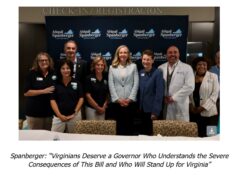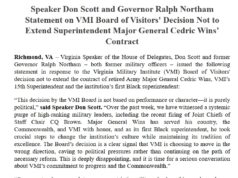In the era of Donald Trump’s Republican Party’s embrace of a path toward authoritarianism, regretfully, there are too many in the Democratic Party who remain wedded to bipartisanship uber alles. This is the mistaken belief that bipartisanship, in and of itself, is a “good” no matter — it seems — the (adverse) policy implications of that bipartisanship.
In Virginia, there are those who seem to believe in (or at least project) a Virginia exceptionalism — that somehow the rot that is core to the Republican Party base is external to the Virginia GOP. This is the famed (or more accurately, fantasized) “Virginia Way,” that enables setting aside the Tea Party domination of the Republican Party and the denunciation of Democrats as “treasonous” and “un-American” as somehow external to Virginia, that Richmond is some island of sanity in a world gone insane.
In 2017, the Democratic Party won sweeping victories across the Commonwealth. While the Virginia GOP held on to the House of Delegates by a thread, the reality is much like Donald Trump’s occupation of the White House: the voters actually rejected Virginia Republicans, with the House Democratic Party candidates receiving nearly 10 percent higher share of the electorate than Republicans (53.4% D vs 43.7% R). And the same thing happened at the Commonwealth-wide level, with now-Governor Northam (D) outpolling Ed Gillespie (R) by 9 points.
Across Virginia — and across the nation — people came out passionately to help secure these victories. Whether postcard writing, making telephone calls, texting, putting up Facebook pages, knocking door-to-door, or otherwise engaging, these 10,000s (more likely 100,000s) of activists did not engage with passion in support of an apolitical vision of bipartisanship, involving unilateral concessions to Republican unreasonableness. They engaged, instead, for the creation of a Virginia Line of resistance against Donald Trump’s kakistocracy and to help set the stage for the resurgence of American democracy — one state, one office, one election at a time.
The chief mandate Virginians gave their leaders on Election Day is to lead this commonwealth away from the counterproductive strife we see across the Potomac.
Ralph Northam, Washington Post, 2 Feb 2018
Governor Northam’s representation of “what voters’ wanted” might be honestly stated, but it is at odds with, well, everything that this Virginian heard and saw during (and since) the 2017 election campaign. Governor Northam should not lose sight that a principle reason for his election has a name: Trump. And also playing a big role in Northam’s victory: the Republican Party’s slavish devotion to Trump.
Northam’s op-ed is difficult to read, as it both has troubling elements, like the assertion that the election seemingly had nothing to do with partisanship, while simultaneously hinting at good policy priorities. Here is one sentence combining the two.
The people who spoke to me about gun violence in their communities, unnecessary obstacles to voting, discrimination against women and LGBT people, and climate change and sea-level rise were not talking to me as Democrats or Republicans.
Look at that list of issues. Is anyone ready to assert that any of those issues are top-tier agenda items (other than for rejecting or doing the reverse) for Republican base voters or Republican politicians?
That list of items, however, are things that that any sensible person should embrace. As to that, look at this description of policy agenda:
…agenda that we are pursuing together focuses on solving real problems people are facing, not dividing people along partisan lines or satisfying special interests.
Key priorities such as connecting workers with the skills that employers need, making schools work better for every child, expanding access to health care, standing up for veterans, reforming our criminal-justice system and getting Virginians moving by improving our transportation infrastructure are a foundation for future economic growth.
If we succeed in advancing these initiatives, we will make life better for all Virginians, no matter who they are or where they live.
Yes … yes .. yes. However, the path to achieve these objectives is not non-partisanship, but partisan politics. The fact is, the Democratic Party’s and Republican Party’s visions for the future across all these arenas (both in Washington, DC, and in Richmond) are radically different, even diametrically opposed. To pretend otherwise, in an op-ed or elsewhere, is frankly to do a disservice.
The reality is that democracy is a checks-and-balances system that involves a process of confrontation and compromise. For Governor Northam to lay out, truthfully, that the Republican Party controls the legislature, and that governance will require compromising with their priorities, is appropriate. For Governor Northam to emphasize that he is ready to take in good ideas, no matter their origination, if it will help Virginia and Virginians, is what we all wish to see from our political leaders. But for Governor Northam to suggest that his election was not due to the passion of those infuriated by Trump’s and Republican damage to the nation does a disservice to those who spent ever so many hours knocking on doors with Northam-Fairfax-Herring pamphlets in their hands.





![With CNBC’s “Best State for Business” Rankings Finalized Soon, Gov. Ralph Northam’s Former Chief of Staff Clark Mercer Wonders, “Will North Carolina match Virginia [which held the title in 2019-2021] and make it a three-peat?”](https://bluevirginia.us/wp-content/uploads/2024/03/threepeat-238x178.jpg)







